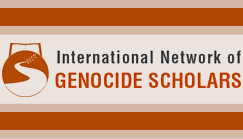Event Title
The Constellation of Genocide Narratives: The Power of Marginalised Voices for Rethinking the Social History of Ethnic Violence
Submission Type
Paper
Abstract
How can we narrate genocides beyond the victimised and the victimisers? How can we move beyond the single story of collective violence that prevails in national accounts of post-genocide nation-building? Drawing on fieldwork conducted over two decades, this presentation adopts a multi-level narrative methodology to illuminate the role of marginalised voices - non-perpetrators, rescuers, families of mixed ethnicity, returnees and other ethnic minorities - for rethinking the social history of genocides. The constellation of genocide narratives sets the conceptual framework for the analysis of the relationship of public and personal narratives. In centering and integrating the stories of previously marginalised social actors, new narrative themes emerge that differ from the almost totalising violence exposed in the foundational master–narrative of the Genocide against the Tutsi. They are themes of ordinary morality and individual responsibility; intimate burdens; communal care and solidarity; double victimization and survival; and mobility and belonging. A publicly untold, shared narrative, also surfaces. Against the social and narrative rupture caused by the violence of genocide, this chronicle from below speaks of “continuity, embeddedness and the everyday”. By identifying social and narrative continuities, this alternative version of the social history of the genocide problematizes ruptures between the “old” (pre-genocide) and “new” (post-genocide) reality; it challenges the overlap of ethnic and social identities of victim and perpetrator by identifying other intersectional subject positions, and it records the complex legacy of the genocide, as an event and as narrative, on the social and narrative lives of the nation and its people.
The Constellation of Genocide Narratives: The Power of Marginalised Voices for Rethinking the Social History of Ethnic Violence
How can we narrate genocides beyond the victimised and the victimisers? How can we move beyond the single story of collective violence that prevails in national accounts of post-genocide nation-building? Drawing on fieldwork conducted over two decades, this presentation adopts a multi-level narrative methodology to illuminate the role of marginalised voices - non-perpetrators, rescuers, families of mixed ethnicity, returnees and other ethnic minorities - for rethinking the social history of genocides. The constellation of genocide narratives sets the conceptual framework for the analysis of the relationship of public and personal narratives. In centering and integrating the stories of previously marginalised social actors, new narrative themes emerge that differ from the almost totalising violence exposed in the foundational master–narrative of the Genocide against the Tutsi. They are themes of ordinary morality and individual responsibility; intimate burdens; communal care and solidarity; double victimization and survival; and mobility and belonging. A publicly untold, shared narrative, also surfaces. Against the social and narrative rupture caused by the violence of genocide, this chronicle from below speaks of “continuity, embeddedness and the everyday”. By identifying social and narrative continuities, this alternative version of the social history of the genocide problematizes ruptures between the “old” (pre-genocide) and “new” (post-genocide) reality; it challenges the overlap of ethnic and social identities of victim and perpetrator by identifying other intersectional subject positions, and it records the complex legacy of the genocide, as an event and as narrative, on the social and narrative lives of the nation and its people.





Comments
View the agenda item.
View Giorgia Dona's bio.